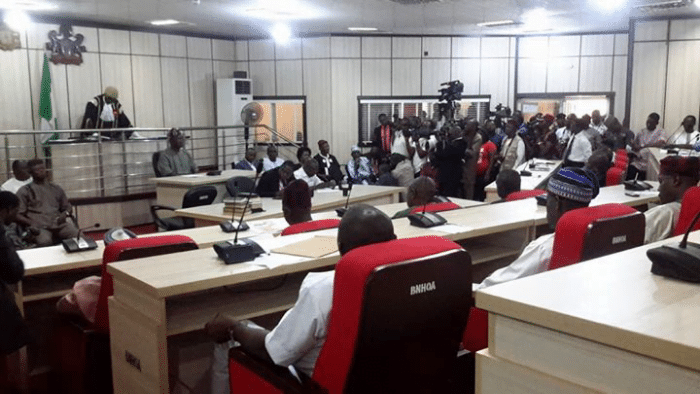The Benue State House of Assembly has suspended four lawmakers for six months over what it described as a botched attempt to impeach the Speaker, Aondona Dajoh.
The affected members are Alfred Berger (Makurdi North), Terna Shimawua (Kian), Cyril Ekong (Obi), and James Umoru (Apa). Their suspension was announced during plenary on Friday, with the leadership insisting that the drastic action was necessary to safeguard the integrity of the legislature.
According to the Assembly, the four lawmakers were accused of spearheading a plot on Thursday night to unseat Speaker Dajoh, a move that was thwarted before it could materialize. The leadership described the attempt as “a direct affront to the stability, order, and authority of the House.”
Confirming the disciplinary measure, the Assembly resolved that the suspended members would not participate in any legislative activity for the next six months. This includes plenary sittings, committee engagements, and other official functions of the House.
“The actions of these members amount to gross misconduct and a violation of the rules guiding this House. Their suspension is to serve as a deterrent to others who may want to undermine the leadership of this Assembly,” a statement from the House leadership read.
The suspension has sparked debate within Benue’s political circles, with analysts suggesting that it reflects deeper divisions within the state legislature. Speaker Dajoh, who assumed leadership with the backing of a majority bloc, has faced rumblings of discontent in recent months. Thursday’s failed impeachment plot appears to be the most serious challenge to his leadership yet.
Impeachment plots are not new in Nigerian politics, especially at the state level, where control of the Assembly is often seen as crucial to broader political calculations. The leadership crisis in Benue mirrors similar tensions in other states where internal rivalries and shifting alliances frequently test the stability of legislative institutions.
For constituents of the affected lawmakers, the suspension raises concerns about representation. With four seats effectively inactive for six months, some observers fear that the people of Makurdi North, Kian, Obi, and Apa may face a gap in legislative advocacy at a time when critical debates on security, infrastructure, and development are ongoing in the state.
However, defenders of the decision argue that the Assembly must prioritize discipline and internal order over individual grievances. “No parliament can function effectively in an atmosphere of conspiracy and disloyalty. The House had to act decisively to protect its integrity,” one senior lawmaker said after Friday’s plenary.
As the suspension takes effect, attention now turns to how the crisis will shape the political climate in Benue ahead of next year’s budget discussions and other key legislative decisions. The sidelining of four members reduces the number of active lawmakers and could strengthen Speaker Dajoh’s hold on proceedings—at least in the short term.
Whether the punishment will calm tensions or fuel further unrest within the Assembly remains to be seen. What is clear, however, is that the Benue State House of Assembly has once again become a focal point of political intrigue in the state’s unfolding democratic drama.





